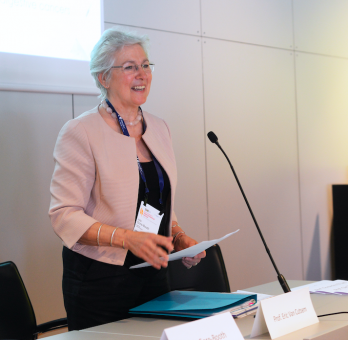Latest News
Please view the latest news articles from across Europe below. Alternatively, filter by news category or search by keyword.
'Public perception about colonoscopy should change'
Published on�26 July 2018�back to previous
 If Europe should benefit from the existing screening programmes, �public perception about colonoscopy should change.��Government Gazette�s Janani Krishnaswamy caught up with�Founder and CEO of EuropaColon,�Jola Gore-Booth, on the sidelines of a recent high-level roundtable on colorectal cancer, to discuss strategies to improve diagnosis, treatment and care of patients in Europe.
If Europe should benefit from the existing screening programmes, �public perception about colonoscopy should change.��Government Gazette�s Janani Krishnaswamy caught up with�Founder and CEO of EuropaColon,�Jola Gore-Booth, on the sidelines of a recent high-level roundtable on colorectal cancer, to discuss strategies to improve diagnosis, treatment and care of patients in Europe.Twenty years ago, when Founder and CEO of EuropaColon, Jola Gore-Booth rang the editor of a popular newspaper to write about bowel cancer, who she knew personally, he said �Don�t be ridiculous. I am not going to write about bleeding bottoms.� Today, you open the newspaper and everybody talks about their symptoms so openly.
Speaking to Government Gazette exclusively, on the sidelines of a recent high-level policy roundtable on colorectal cancer, she said: �In the past, many people afflicted with this disease felt embarrassed to discuss their affliction. Today, there are a greater number of people speaking out to help break down the taboo around poo.� Acknowledging that colorectal cancer is preventable, treatable and beatable, she says: �The stigma on the whole has gone, or is much better than it used to be.� However, �the issue around the word �cancer� still exists and the doubts about how treatable colorectal cancer is,� continues to haunt those diagnosed with the disease.
Several years back, Jola started off with an intention to set up a colorectal cancer advocacy group in every country in Europe with the intention of pushing for screening, improving patient support, providing greater and equitable access to medicine, improving survivorship. Today, EuropaColon works with patients, carers, clinicians, governments, and the European Commission to create an effective and powerful colorectal and digestive cancers community.
The patient organisation is committed to preventing deaths from digestive cancers and improving the quality of life of those affected by these diseases.
Over the past two decades, early detection through screening has increased significantly across Europe, yet �there is a clear indication that not enough progress is being made towards implementing a system of colorectal cancer screening across the European Union.�
According to Bowel Cancer UK, nearly 166,000 people in the UK are unaware that they have the condition. Though UK has a wide-ranging screening programme, there were several recent calls on the government to improve the NHS�s current screening programme for the disease. Most recently, a grieving woman whose mother died from bowel cancer has delivered a petition to the UK Parliament demanding a reduction in the screen age limit.
Despite the 2003 Commission recommendations on colorectal cancer screening, only 6 member states have fully-operational running formal population-based screening programmes. Most of Eastern Europe is still unprepared.
Eastern European governments are not making screening programmes a priority, quality assurance mechanisms are not effective and EU guidelines are not being followed, many a times. Participation rates are low, just 11 percent in Latvia for example and attendance at colonoscopy referral appointments following a positive test result is also poor. Some countries are planning and piloting organised programmes, but not all are effective.
Moreover, there is a need to move towards a more personalised screening programme based upon personal risk assessment, taking into account factors such as age, lifestyle and hereditary risk. To support and supplement a more personalised approach to screening, experts call for a shift in the role GPs in personalised screening.
While screening programmes differ widely across Europe, some of the biggest challenges in screening of colon and rectal cancers relates to �negative attitudes to screening tests.� The promotion of CRC screening for older adults is becoming increasing difficult because reading CRC prevention information may evoke embarrassment, fear, and anxiety towards the screening procedure and cancer diagnosis.
If Europe should benefit from the existing screening programmes, �public perception about colonoscopy should change.� As Jola notes, �the stigma relating to the disease has eased out, the fear of cancer and fear of colorectal cancer screening and colonoscopy in specific is still high.� Public awareness of colonoscopy and the benefits of the procedure remain low. Individuals are often deterred from attending their colonoscopy appointments and participating in screening programmes due to the often-negative perceptions of colonoscopy. Though every citizen has a right to decide to opt out of screening, Jola says it is important to make informed and evidence-based decisions. �Just because Mrs James, who is ten doors down the street, had a bad colonoscopy, this should not stop you from having one for yourself.�
Another stumbling block on our road to screening relates to bowel cleansing. A successful colonoscopy is closely linked to adequate bowel preparation, with poor bowel preparation often resulting in missed precancerous lesions. �Without a new mind-set on these issues, rates of attendance at colonoscopy appointments and participation in screening programmes will remain lower than they should be.� It remains crucial for us to break down the misconceptions about undergoing the procedure and raise awareness about the importance of procedures.
While it is important for European governments to improve their screening programmes, Jola points out that �people in Europe should start taking responsibility for their own health� and act on the information on hand regarding warning signs, symptoms and risk factors. Highlighting the link between obesity and colorectal cancer, she noted that more importance should be given towards incorporating a preventive diet and exercise.
Click here to read the original article from Government Gazette.�




-(2).png)
.png)

